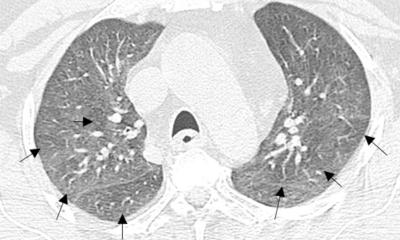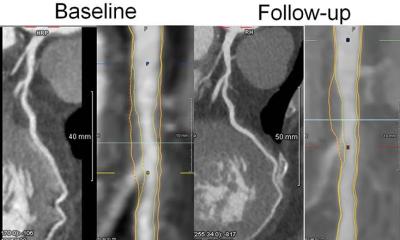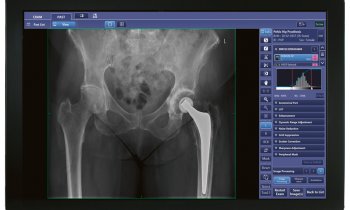Image source: Shutterstock/anttoniart
Article • Overheard at ISRRT
Radiography reflection of Covid on the frontline
Delegates at an international radiography conference were given an insight into the impact Covid-19 has had on their profession and practice in five countries across the world. A special session at the online ISRRT (International Society of Radiographers and Radiological Technologists) congress in Dublin (August 20-22) heard experiences from Thailand, Nigeria, Italy, India and Ireland, with presentations from radiographers in each country. They discussed how Covid had affected their nation, but also looked at the impact it had on radiographers as they faced up to the pandemic as frontline practitioners.
Report: Mark Nicholls
Thailand
Dr Napapong Pongnapang, President of the Thai Radiological Technologist Board, and from the Department of Radiological Technology at Mahidol University in Bangkok, said that as of mid-August there were 928,000 cases and 7,734 deaths from Covid-19 in Thailand. With 5,500 licensed radiographers across the country, there are still 180 hospitals which do not have radiographers working full time on site and a shortage of radiographers nationwide.
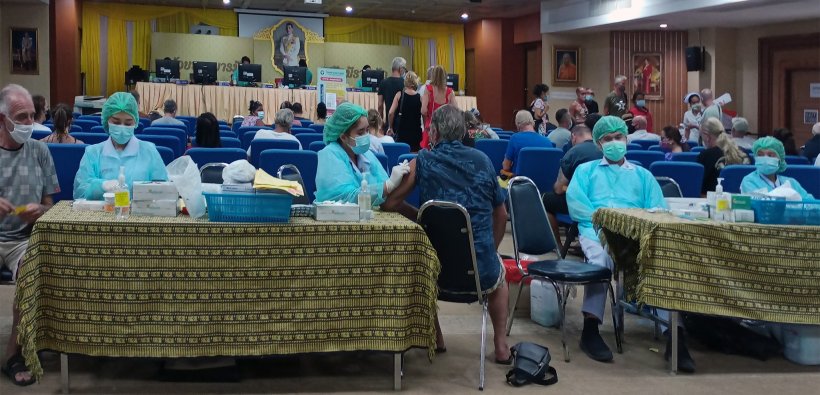
Image source: Per Meistrup, TH-COVID19 Vaccination IMG20210627145557, CC BY-SA 4.0
The Thai professional body issued guidelines for practice during the pandemic, but a major problem in the initial stages was a shortage of personal protective equipment (PPE), though that has since improved. Vaccination of frontline workers started in early 2021 but the arrival of the Delta variant in July created major problems, particularly as they received the inactivated viral vaccine, which is less effective against the variant. Dr Pongnapang said the healthcare system is struggling to cope, radiographers were becoming infected, and a campaign was launched to encourage retired radiographers back to work to help. Lessons learned include the need to train people better to deal with infection control, he said, and that radiographers should have a stronger voice as professional frontline health workers.
Nigeria
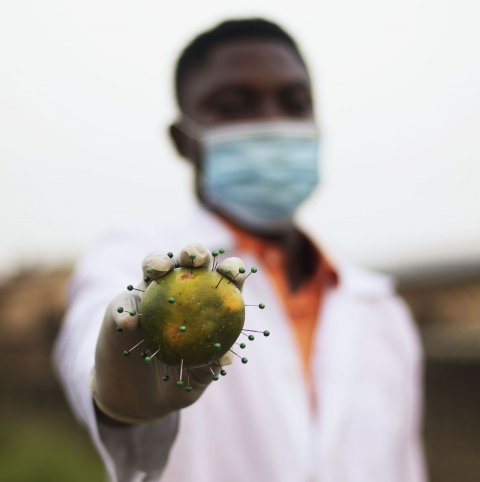
Image source: Ayorinde Ogundele, Makeshift Corona virus model, CC BY-SA 4.0
Radiographer Augustine Ezekwe, who trained in Nigeria, discussed the challenges that radiographers were facing in the country. Major issues included PPE availability and the quality of the masks, personnel welfare, stress and professional development programmes cancelled or postponed.
With a shortage of protective equipment, many practitioners were forced to buy their own supplies to protect themselves; staff also faced pay cuts and transportation difficulties in an already harsh economic situation; there was increased stress through fear of contracting the virus; poor information; and an increase in workload.
Italy
An insight into the situation in Italy was provided by Diego Catania, Radiography Services Manager at San Raffaele Research Hospital in Milan and President of Milan Professional Body of Radiographers and Health Professionals. He was personally involved in the management of the pandemic in the Lombardy region and its capital Milan, the area worst affected in the first phase.
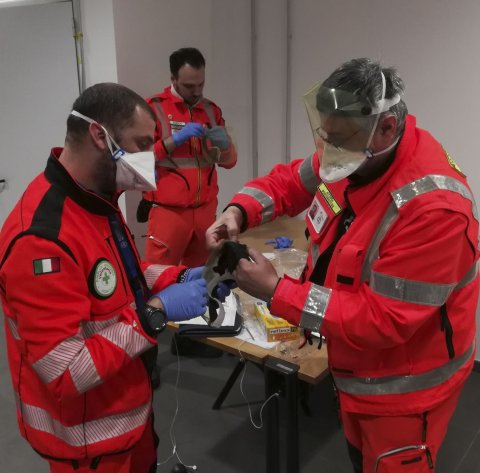
Image source: Dipartimento Protezione Civile from Italia, Emergenza coronavirus (49496883162), CC BY 2.0
By March 2020, Italy had 6,000 new cases and 627 deaths in just 24 hours but established aspecialist intensive care unit at San Raffaele to tackle the rise in patients, with 24 beds and specialist equipment. An internal reorganisation saw the establishment of a task force of radiographers, changing shift patterns to limit contact with infected patients and transformation of departments into Covid wards for isolated patients. There were weekly meetings to check the number of Covid cases in the hospital, weekly Covid testings of radiographers and distribution of PPE depending on available resources. Catania also noted high levels of co-operation and commitment from health professionals. “Department managers were present at weekends to offer support to medical staff,” he said, “and due to continuous exchange of experience with foreign colleagues, Italy has been a model for the world.”
India
Srinivasulu Siramda, a Radiological Safety Officer and MRI technologist at Nizam’s Institute of Medical Sciences, Hyderabad and General Secretary of the Society of Indian Radiographers (SIR), said many organizations and cultures came together to join the fight against Covid in India. While restrictions were in place during the first wave with use of masks, social distancing and sanitation and restrictions on movement, over-confidence in the second wave from March 2021 onwards, during elections and rallies, led to a significant rise in cases.
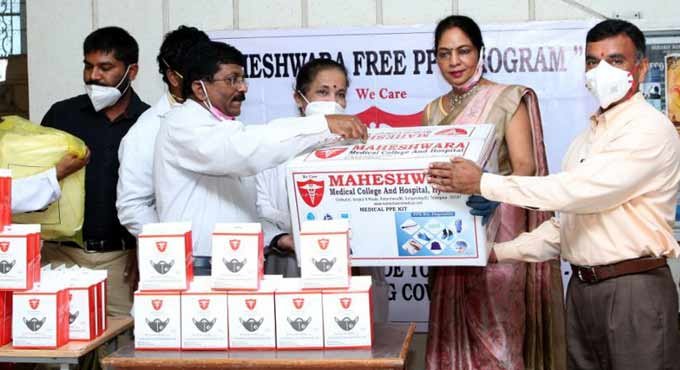
Image source: Cheeku009, Maheshwara-PPE-Kits Osmania, CC BY-SA 4.0
SIR introduced awareness programmes aligned with the radiography principles of distancing and shielding to protect against Covid, with PPE, sanitization, proper disposal of bio-waste, online lectures, incentives and support for frontline staff, and effective staffing of Covid wards. Measures also included bedside radiography protocols, separate radiography rooms for positive and suspected cases and a 24-hour radiography service. Siramda said he believed India had successfully faced the Covid-19 pandemic, but despite a vaccination rate of 90% in healthcare workers, more than 750 doctors, nurses and other health professionals had died as a result of Covid-19.
Ireland
Ultimately, there is a post-pandemic bottleneck waiting to happen in the system.
Sonyia McFadden
Dr Sonyia McFadden, a senior lecturer in diagnostic radiography in the School of Health Science at the University of Ulster, discussed the impact of Covid-19 on radiographers in Northern Ireland. Presenting research titled 'An investigation of the impact of Covid-19 on Diagnostic/Therapeutic Radiographer and radiography service provision in Northern Ireland,' she said: “Covid-19 has had a significant impact on radiography staff and service delivery. There was cancellation of screening and routine surgery, and ultimately there is a post-pandemic bottleneck waiting to happen in the system.”
For the study, staff surveys and interviews with managers were conducted. From the 110 survey responders, 43% initially declared having little or no experience in working with infectious patients, 75% received training in infection control, and 90% said they felt comfortable in the department during the pandemic. While 18% of radiographers expressed dissatisfaction regarding access to appropriate PPE in March 2020, this dropped to 6% by May 2020 and none since September 2020.
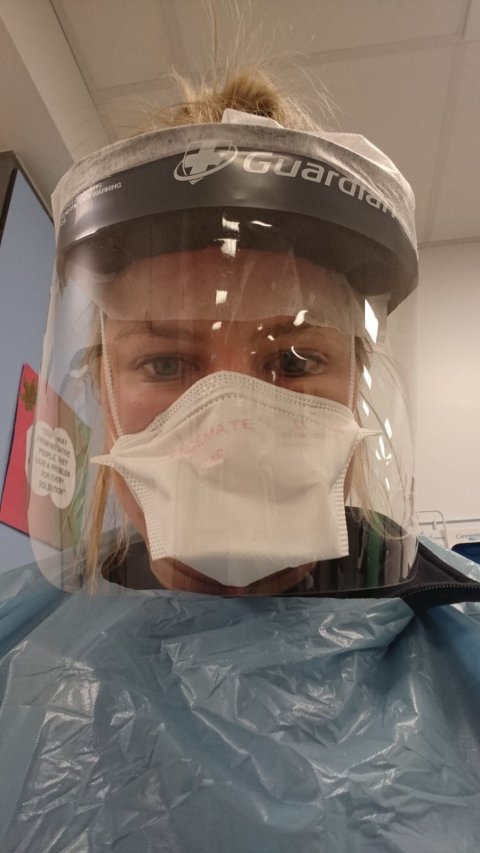
From interviews, there were reports of physical and psychological impact of changing working patterns, anxiety around Covid-19, fatigue, lack of annual leave and social environment. What was noted was the resilience of radiography staff, with some redeployed during the pandemic.
Some of the lessons learned during the pandemic were considered to have a positive impact on working conditions, such as greater mixing with multi-disciplinary teams, more meetings and communication, improved infection control practices, and decisions made quicker with 'red tape' removed, and staff flexibility with different approaches for work. But the crisis also highlighted looming problems with patient appointments delayed or cancelled, the need for more personnel, staff that are tired and having burnout, and the need for a flexible and adaptable Covid response plan that can be applied across the board very quickly, as well as investment in technology and equipment and better communication with patients to improve the patient experience. Dr McFadden said managers, who were proud of their professional and adaptable workforce, feel working practices will not return to the same as before, but that radiographers need to have a stronger identity within the hospital.
02.09.2021



